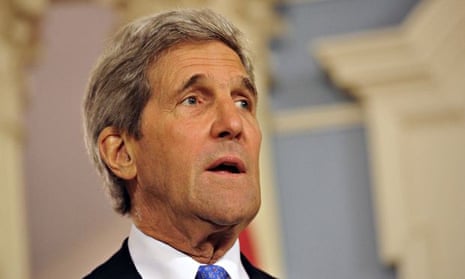The US secretary of state, John Kerry, launched a new global effort on Wednesday to save oceans “under siege” from over-fishing, plastic pollution and climate change.
Kerry said he hoped to build momentum for the protection effort at a two-day summit at the State Department next week.
The 16-17 June gathering will for the first time bring together world leaders, business executives, scientists, and environmental activists in an attempt to deal with major threats to oceans.
“Increasingly, the ocean is threatened,” Kerry told a small group of reporters at the State Department. “The world's oceans, as vast as they are, as much as they elicit a sense of awe for size and power, they are under siege.”
Next week's summit offers Kerry a chance to elevate those concerns in the public arena.
State Department officials said the conference is an important start to a much broader effort to mobilise the international community around ocean protection.
For Kerry the issue is personal. He said he been passionate about the oceans since he was a small child growing up in Massachusetts and as a young man serving in the navy.
In the Senate, Kerry was known as a champion on both oceans and climate change. He told reporters he had worked for years to end drift net fishing – which he likened to strip mining.
Next week's summit is an attempt to get the international community to focus on three major threats: over-fishing, pollution, and acidification, which is caused by climate change.
In recent years, there has been growing concern about the threat to food security from over-fishing. Global fisheries stocks are severely depleted – from illegal and unsustainable fishing, and because of changing migration patterns under climate change.
“Most of the world's fisheries are being overfished,” Kerry said. New technologies made it easier to monitor shipping vessels on the high seas and even track catches from ship to port.
But Kerry acknowledged there remained a big gap between regulations and enforcement. “The problem is there is a great debate over the science. There is a great battle over who is right and how do you base a regulatory rule on something if you don't really know,” he said.
Officials and some environmental groups said they hoped the summit would spur efforts to get the public to commit to only buy sustainable seafood, as a way of safeguarding severely depleted fishing stocks.
There was growing anticipation that American and British officials would commit to new marine protection areas, which would allow some stocks to recover.
There could also be moves by some companies to sign on to efforts to collect their plastic products, before they end up as ocean debris.
The State Department said it also hoped to set specific targets for reducing plastic that goes into the sea, as well as fertiliser run-off which is polluting water ways and adding to ocean dead zones.
But Kerry faces only limited scope for concrete results.
State Department officials said they expected perhaps a handful of prime ministers and presidents at the summit, mostly from small island states.
There is virtually no chance of getting any action from Congress, so long as it remains dominated by Republicans.
But Kerry and officials said they hoped the mix of guests at the summit could help unlock efforts to deal with ocean threats. The conference would be part of a longstanding initiative to elevate oceans as part of foreign policy. “We want to come out of it with an action agenda,” he said.

Comments (…)
Sign in or create your Guardian account to join the discussion